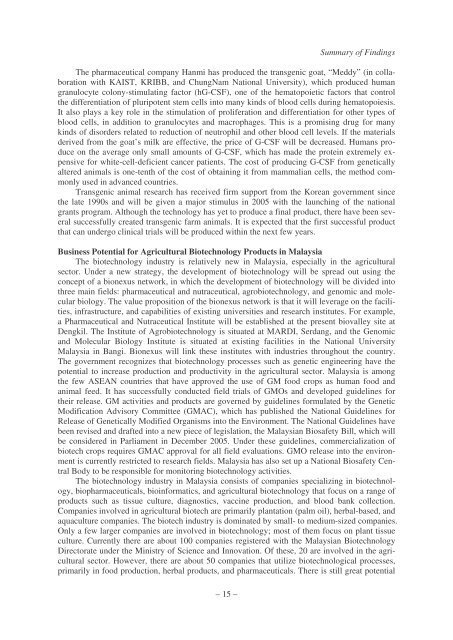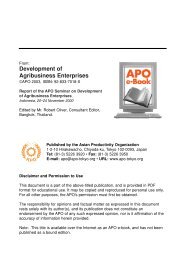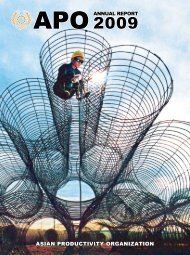Business Potential for Agricultural Biotechnology - Asian Productivity ...
Business Potential for Agricultural Biotechnology - Asian Productivity ...
Business Potential for Agricultural Biotechnology - Asian Productivity ...
Create successful ePaper yourself
Turn your PDF publications into a flip-book with our unique Google optimized e-Paper software.
– 15 –<br />
Summary of Findings<br />
The pharmaceutical company Hanmi has produced the transgenic goat, “Meddy” (in collaboration<br />
with KAIST, KRIBB, and ChungNam National University), which produced human<br />
granulocyte colony-stimulating factor (hG-CSF), one of the hematopoietic factors that control<br />
the differentiation of pluripotent stem cells into many kinds of blood cells during hematopoiesis.<br />
It also plays a key role in the stimulation of proliferation and differentiation <strong>for</strong> other types of<br />
blood cells, in addition to granulocytes and macrophages. This is a promising drug <strong>for</strong> many<br />
kinds of disorders related to reduction of neutrophil and other blood cell levels. If the materials<br />
derived from the goat’s milk are effective, the price of G-CSF will be decreased. Humans produce<br />
on the average only small amounts of G-CSF, which has made the protein extremely expensive<br />
<strong>for</strong> white-cell-deficient cancer patients. The cost of producing G-CSF from genetically<br />
altered animals is one-tenth of the cost of obtaining it from mammalian cells, the method commonly<br />
used in advanced countries.<br />
Transgenic animal research has received firm support from the Korean government since<br />
the late 1990s and will be given a major stimulus in 2005 with the launching of the national<br />
grants program. Although the technology has yet to produce a final product, there have been several<br />
successfully created transgenic farm animals. It is expected that the first successful product<br />
that can undergo clinical trials will be produced within the next few years.<br />
<strong>Business</strong> <strong>Potential</strong> <strong>for</strong> <strong>Agricultural</strong> <strong>Biotechnology</strong> Products in Malaysia<br />
The biotechnology industry is relatively new in Malaysia, especially in the agricultural<br />
sector. Under a new strategy, the development of biotechnology will be spread out using the<br />
concept of a bionexus network, in which the development of biotechnology will be divided into<br />
three main fields: pharmaceutical and nutraceutical, agrobiotechnology, and genomic and molecular<br />
biology. The value proposition of the bionexus network is that it will leverage on the facilities,<br />
infrastructure, and capabilities of existing universities and research institutes. For example,<br />
a Pharmaceutical and Nutraceutical Institute will be established at the present biovalley site at<br />
Dengkil. The Institute of Agrobiotechnology is situated at MARDI, Serdang, and the Genomic<br />
and Molecular Biology Institute is situated at existing facilities in the National University<br />
Malaysia in Bangi. Bionexus will link these institutes with industries throughout the country.<br />
The government recognizes that biotechnology processes such as genetic engineering have the<br />
potential to increase production and productivity in the agricultural sector. Malaysia is among<br />
the few ASEAN countries that have approved the use of GM food crops as human food and<br />
animal feed. It has successfully conducted field trials of GMOs and developed guidelines <strong>for</strong><br />
their release. GM activities and products are governed by guidelines <strong>for</strong>mulated by the Genetic<br />
Modification Advisory Committee (GMAC), which has published the National Guidelines <strong>for</strong><br />
Release of Genetically Modified Organisms into the Environment. The National Guidelines have<br />
been revised and drafted into a new piece of legislation, the Malaysian Biosafety Bill, which will<br />
be considered in Parliament in December 2005. Under these guidelines, commercialization of<br />
biotech crops requires GMAC approval <strong>for</strong> all field evaluations. GMO release into the environment<br />
is currently restricted to research fields. Malaysia has also set up a National Biosafety Central<br />
Body to be responsible <strong>for</strong> monitoring biotechnology activities.<br />
The biotechnology industry in Malaysia consists of companies specializing in biotechnology,<br />
biopharmaceuticals, bioin<strong>for</strong>matics, and agricultural biotechnology that focus on a range of<br />
products such as tissue culture, diagnostics, vaccine production, and blood bank collection.<br />
Companies involved in agricultural biotech are primarily plantation (palm oil), herbal-based, and<br />
aquaculture companies. The biotech industry is dominated by small- to medium-sized companies.<br />
Only a few larger companies are involved in biotechnology; most of them focus on plant tissue<br />
culture. Currently there are about 100 companies registered with the Malaysian <strong>Biotechnology</strong><br />
Directorate under the Ministry of Science and Innovation. Of these, 20 are involved in the agricultural<br />
sector. However, there are about 50 companies that utilize biotechnological processes,<br />
primarily in food production, herbal products, and pharmaceuticals. There is still great potential
















